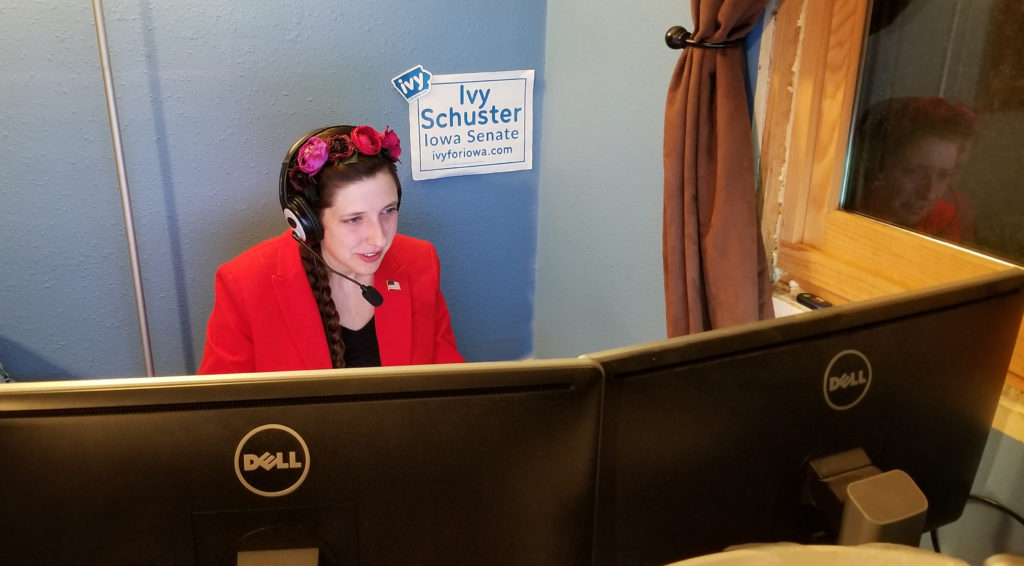Candidates for Senate District 38 and House District 76, all running to represent Grinnell in the Iowa state legislature, answered questions about systemic racism, mental health reform and the environment at the second forum this month hosted by the Grinnell League of Women Voters.
Ivy Schuster, an IT Specialist at Grinnell College, is running as the Democratic candidate for Senate District 38. The seat is being vacated by Republican Tim Kapucian, who announced earlier this year that he would not be seeking re-election.
Schuster described the core of her platform as “rural revitalization,” centered around environmental improvement, increased healthcare access and expanded voting rights. She is facing a challenge from Republican Dawn Driscoll. Driscoll chose to send in a statement rather than attend, writing that her reasons for running are to advocate for agriculture, education and healthcare reform.
For House District 76, Incumbent Dave Maxwell, a Republican, is facing two challengers. Like Driscoll, Maxwell also sent a statement.
“I think now more than ever is the time to vote for experienced lawmakers,” Maxwell wrote, after emphasizing his experience in budget negotiations within the House and throughout his previous two terms. Maxwell said he was unable to attend the Zoom meeting, since his home in Gibson IA, a rural town on the edge of Poweshiek County with a population of just 60, often leaves him without internet.
Sarah Smith, a Democrat who also works for the College as the Director of Outreach Programs and Events, is running against Maxwell as a “common sense candidate,” according to her opening statement.
Maxwell’s other challenger, Kamal Hammouda, owner of Relish restaurant in Grinnell, is running as an independent. “Both party’s leadership have hijacked the conversation and the dialogue,” he said, explaining his decision to abstain from party support. As a first-generation immigrant, Hammouda said that he wants “to bring a voice that’s almost always absent from the conversation” to the Iowa House of Representatives.
Candidates were asked whether they view systemic racism as a problem in Iowa and, if so, how they would address the problem, particularly in rural, majority-white towns. The questioner cited an incident in Charles City, Iowa, where a Black baseball player was taunted by racist chants at a baseball game.
In response, Schuster said: “Yes, you can’t just depend on ‘Iowa nice’ to say [racism] doesn’t exist here.” Schuster pointed to the Des Moines Black Lives Matter movement and their negotiations with Governor Kim Reynolds over the summer as a successful avenue for progress.
After BLM protests in June, Reynolds met with activists and signed an executive order to restore voting rights to felons. Earlier that month, she signed a ban on chokeholds into law.
Schuster also said that she would support “more of a focus on providing funding for other community resources, for mental health services and drug addiction and homelessness” when speaking on the topic of funding for law enforcement.
Smith said that she absolutely sees systemic racism in Iowa and emphasized the need for all people to feel safe and heard within Iowa. She supports racial-bias training within law enforcement and expressed admiration for the Black Lives Matter movement.
During her campaign, she’s met with the Grinnell Police Department and supports their contract with Lexipol, a private company which provides real-time policy updates and training manuals for law enforcement.
When addressing Black Lives Matter, Hammouda said that, “listening to them is not enough, being not racist is not enough, being anti-racist is a must,” and expressed support for education regarding other cultures.
Candidates were also asked if they’d support the aims of the Green New Deal.
Both Schuster and Smith said that, because the Green New Deal is a federal policy, they hadn’t looked too closely at the plan. Instead, Schuster spoke broadly about environmental change: “We’ve shown it through ethanol — we’ve shown that Iowans can be innovators to bring the next step forward through green practices. … I know that ethanol is not perfect, I know that wind energy is not perfect. But we have to remember that these are the next steps forward until the next thing is discovered.”
Smith agreed with Schuster and said that, if elected, she’d work to make Iowa “safe and clean.” She also said she’d work to provide incentives for renewable energy companies to come to Iowa.
“I think it’s really, really important at this point in the world that we train the next generation of the Iowa workforce in renewable energy jobs,” Smith said.
Hammouda said he supports a shift to renewable energy in Iowa and that he would work to reduce fossil fuel usage, but not remove it entirely. “We don’t have to give it up completely. … It’s not about extremes, it’s about moderation,” he said.
Candidates were also asked about the quality of mental health treatment in Iowa. In 2017, the Treatment Advocacy Center ranked Iowa last out of all states in their number of psychiatric beds available per capita.
In answering how he’d expand access to mental health treatment, Hammouda mentioned his experience as a food service director and on committees in mental health hospitals across Iowa.
“This is one of the sorest subjects for me, … because we talk about the issue, but we don’t provide the resources to change the issue,” he said. Hammouda said that he’d support a redirection of corporate welfare spending into expanding mental healthcare in Iowa.
Schuster addressed mental health reform as one of her top priorities if elected to the Iowa Senate. She supports Gov. Reynolds’ one cent increase in the sales tax, where five-eighths of each cent would go towards expanding mental health services statewide. However, she does not support Reynolds’ proposed income tax cut, which the governor also hopes to fund with the sales tax.
Smith echoed the need to increase the number of mental healthcare providers and facilities. “Mental health will absolutely be one of my top issues. It’s too important to ignore. … I want to improve simply the access to mental health services, especially for our rural communities.”
In their closing statements, both Democrats emphasized the importance of voting. “If there’s any message I can leave with all of you tonight, it’s this: vote,” Schuster said. “And if you can’t, encourage and push and help others to vote as well.”
Both the Senate and the House election will appear on the general election ballot on Nov. 3.





































































